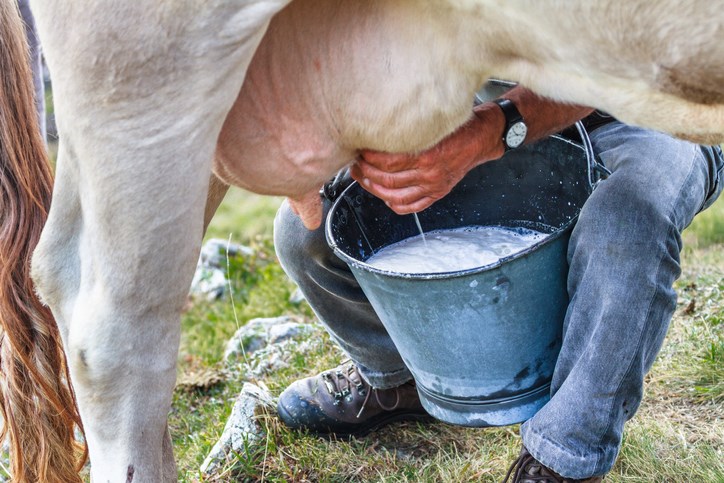There’s a legal way to consume raw milk in Canada: buy it in the United States and bring it home.
Of the 13 states bordering Canada, 12 have legal raw milk. More than 40 have it legal in some form, yet the U.S. has not had a death from raw milk in more than two decades.
This odd juxtaposition pulls back the curtain on Canada’s sacred cows and illiberal prohibition. While the federal government has legalized cannabis nationwide – albeit with boneheaded regulations and a thriving black market – Canadians are still not free to buy a safe, nutritious food consumed widely around the world.
Not only does raw-milk prohibition favour rent-seeking agendas and the regulatory state, but lobbying groups are also misleading the public. To prop up the economic albatross against small, independent farms, Canadian law describes unpasteurized milk as a “health hazard.” B.C. Dairy, a trade association, also contends: “There is no evidence that raw milk has any health or nutritional benefits over pasteurized milk.”
Both claims indicate ulterior motives and fall flat under cursory examination, especially with the U.S. counterexample staring Canada in the face.
The first assumes Canadians are too dumb to assess the risks and make up their own minds. The alleged dangers of raw milk will be news to the countless communities and families worldwide, including my own in New Zealand, who have grown up on raw milk for generations. Meanwhile, all manner of sugar- and additive-laden junk food is available at one’s fingertips. It’s an order of magnitude safer than fish, shellfish and eggs, all of which are readily available raw.
The second, regarding nutritional benefits, is dishonest and easily refuted – as though not a single person nor a single study has ever demonstrated a benefit from raw milk. The Belfast Telegraph reports that “Scientists at the University of London gave children a couple of glasses of raw milk a week. They found that it seemed to cut their chances of developing hay fever by 10 per cent and eczema by 38 per cent,” among other benefits. Although not willing to recommend raw milk outright, WebMD reports a positive impact on one’s immune system, highlighted by Amish communities: “The hope is that we can isolate the protective factor in raw milk.”
A tragedy of the scramble for political largess and power is its deleterious impact on public discourse and literacy. When interest groups have glaring incentives to tilt the debate, they predictably do so and tilt policy outcomes.
What motivates the likes of the relevant regulators and industry lobbies?
These motives are leaking out little by little: their bureaucratic scope and privileged market status as incumbents and gatekeepers.
As explained by Sally Fallon Morell at a recent Weston A. Price Foundation conference, regulators would struggle to oversee decentralized milk suppliers. The regulator’s raison d’être depends on centralized supply chains where inspectors can easily place their stamp of approval. Legal raw milk allows and favours sales direct from the farm, which cuts out the middleman and inspectors. It enables heightened scrutiny and accountability of each farmer from the consumer but not from the regulator.
The plot thickens. As reported by the Farmers Forum agricultural newspaper, “Beyond the matter of health and safety, support for the mandatory pasteurization of consumer milk is … a proxy for support of supply management. Control oversupply – a key tenet of supply management – becomes more difficult if all milk doesn’t have to leave the farm for processing.”
In other words, many farmers profit from Canada’s archaic supply-management protectionism, even if it drives 200,000 Canadians into poverty. As good cronies, they ally with regulators to maintain barriers to entry and the golden goose for incumbents. It translates to roughly $438 extra taken annually from each Canadian family.
Similarly, dairy processors face a zero-sum game for market share. A litre of milk bought directly from the farmer is a litre without the processors’ overhead. That explains why the Dairy Processors Association of Canada has become an arm of the regulatory state, wedded to supply management. Such is its entitlement mentality; trade deals that open the door to more imports cause the association to clamour for compensation, as though processors deserve handouts for people choosing not to buy from them.
Ireland’s raw-milk prohibition became null in 2007, given a conflict with European Union regulations. Despite predictable fearmongering from government entities such as the Food Safety Authority, commerce in raw dairy has blossomed. Determined Irish, many of whom grew up on raw milk before the 1996 prohibition, lobbied for what they knew could be an opportunity given their sterling reputation for dairy.
Not only have farmers stepped in to meet demand, they have organized as Raw Milk Ireland to prevent a ban and foster prudent, self-directed regulation. With success and support visible, Raw Milk Ireland has “been able to have jointly fostered a spirit of co-operation working with rather than against the authorities.”
Canada’s quiet dictatorship over milk is standing firm for self-interest, not for Canadians. U.S. states have gradually come to their senses and liberalized, but Canada has remained obstinate. As Karen Selick wrote for the Financial Post, “It’s time for the federal and provincial legislatures to pay attention, just as they finally did with marijuana, and remove this thorn from everyone’s side.”
Fergus Hodgson is a research associate with the Frontier Centre for Public Policy.
© Troy Media



